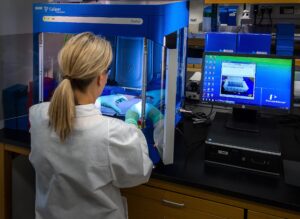
Artificial Intelligence (AI) is rapidly transforming healthcare by enabling faster and more accurate diagnosis, improving treatment outcomes, reducing costs, and enhancing patient care. As the healthcare industry faces increasing demand, and technology advances, AI has become a vital tool in managing patient data and improving clinical workflows. In this article, we will discuss the latest developments in AI technology and its potential to revolutionize healthcare.
- Medical Imaging Analysis AI-based medical imaging analysis is revolutionizing the way doctors diagnose diseases. Using deep learning algorithms, AI-powered software can analyze medical images such as X-rays, MRIs, and CT scans to detect anomalies that might be difficult for human radiologists to spot. AI algorithms can also be trained to identify specific features in medical images to aid in diagnosis. For example, AI can detect breast cancer from mammograms with higher accuracy than a human radiologist. It can also identify specific patterns in MRI images to aid in the diagnosis of Alzheimer’s and Parkinson’s disease.
- Personalized Treatment Personalized medicine involves tailoring treatment plans to individual patients based on their genetic makeup, lifestyle, and other factors. AI algorithms can analyze vast amounts of patient data to identify patterns and predict outcomes to develop personalized treatment plans. By leveraging predictive analytics, AI can help doctors prescribe the most effective medications and dosages, reducing the risk of adverse drug reactions and side effects. AI-powered chatbots and virtual assistants can also provide personalized advice and support to patients, helping them manage chronic conditions and adhere to treatment plans.
- Natural Language Processing AI-powered natural language processing (NLP) technology can extract insights from unstructured data such as electronic health records (EHRs) and patient notes. NLP algorithms can analyze patient data to identify risk factors and develop treatment plans. AI-powered chatbots and virtual assistants can also use NLP to answer patient questions and provide personalized health advice. This technology can improve the accuracy of diagnoses, reduce administrative burden on clinicians, and streamline clinical workflows.
- Predictive Analytics AI algorithms can analyze vast amounts of patient data to identify patterns and predict outcomes. By leveraging predictive analytics, doctors can identify at-risk
- AI is transforming healthcare by enabling faster and more accurate diagnosis, improving treatment outcomes, reducing costs, and enhancing patient care. Latest developments in AI include medical imaging analysis, personalized treatment plans, natural language processing, and predictive analytics. AI-powered software can analyze medical images to detect anomalies that might be difficult for human radiologists to spot, and develop personalized treatment plans based on patient data. Natural language processing technology can extract insights from unstructured data and streamline clinical workflows. AI algorithms can predict outcomes and identify at-risk patients. AI is revolutionizing healthcare and improving patient outcomes.
- AI manages patient data, reducing administrative burden on clinicians, and improving patient outcomes. It is also transforming drug discovery and clinical trials, accelerating the development of new drugs and treatments. AI-powered robots and devices are improving surgical precision and reducing the risk of complications. Virtual reality and augmented reality technologies are enhancing medical training and improving patient experiences. Overall, AI is revolutionizing healthcare, and its potential to transform the industry is immense.

As with any technology, AI in healthcare raises ethical and regulatory issues. The use of AI algorithms to make clinical decisions requires careful consideration of ethical and legal implications, including issues of bias, privacy, and data security. Regulators are grappling with these issues, and guidelines and regulations are being developed to ensure that AI is used responsibly and in accordance with established ethical and legal standards.
Despite these challenges, the potential of AI in healthcare is enormous, and the pace of innovation is accelerating. As technology continues to advance, AI will undoubtedly play an increasingly significant role in shaping the future of healthcare. With the ability to analyze vast amounts of data, identify patterns, and predict outcomes, AI has the potential to revolutionize healthcare and improve patient outcomes on a scale never before seen.
In conclusion, AI is transforming healthcare by enabling faster and more accurate diagnosis, improving treatment outcomes, reducing costs, and enhancing patient care. The latest developments in AI, including medical imaging analysis, personalized treatment plans, natural language processing, and predictive analytics, are revolutionizing the industry. While ethical and regulatory challenges remain, the potential of AI to improve patient outcomes and transform healthcare is immense, and the future of the industry is exciting and promising.
Another area where AI is having a significant impact on healthcare is in drug discovery and clinical trials. Drug development is a long and expensive process, and many promising drugs fail to make it to market. AI is helping to accelerate this process by enabling researchers to analyze vast amounts of data, including clinical trial data and molecular structures, to identify potential drug candidates more quickly and accurately. By using AI to predict the efficacy of different compounds, researchers can prioritize those with the greatest likelihood of success, reducing the time and cost involved in bringing new drugs to market.
In addition to its impact on clinical care and drug development, AI is also transforming medical training and education. Virtual reality (VR) and augmented reality (AR) technologies are increasingly being used to create immersive learning experiences for medical students and trainees. These technologies allow students to practice surgical procedures and other medical interventions in a safe and controlled environment, without the risk of harm to real patients. By providing realistic and interactive training experiences, AI is helping to improve the quality of medical education and training, and preparing the next generation of healthcare professionals to provide better care to patients.







